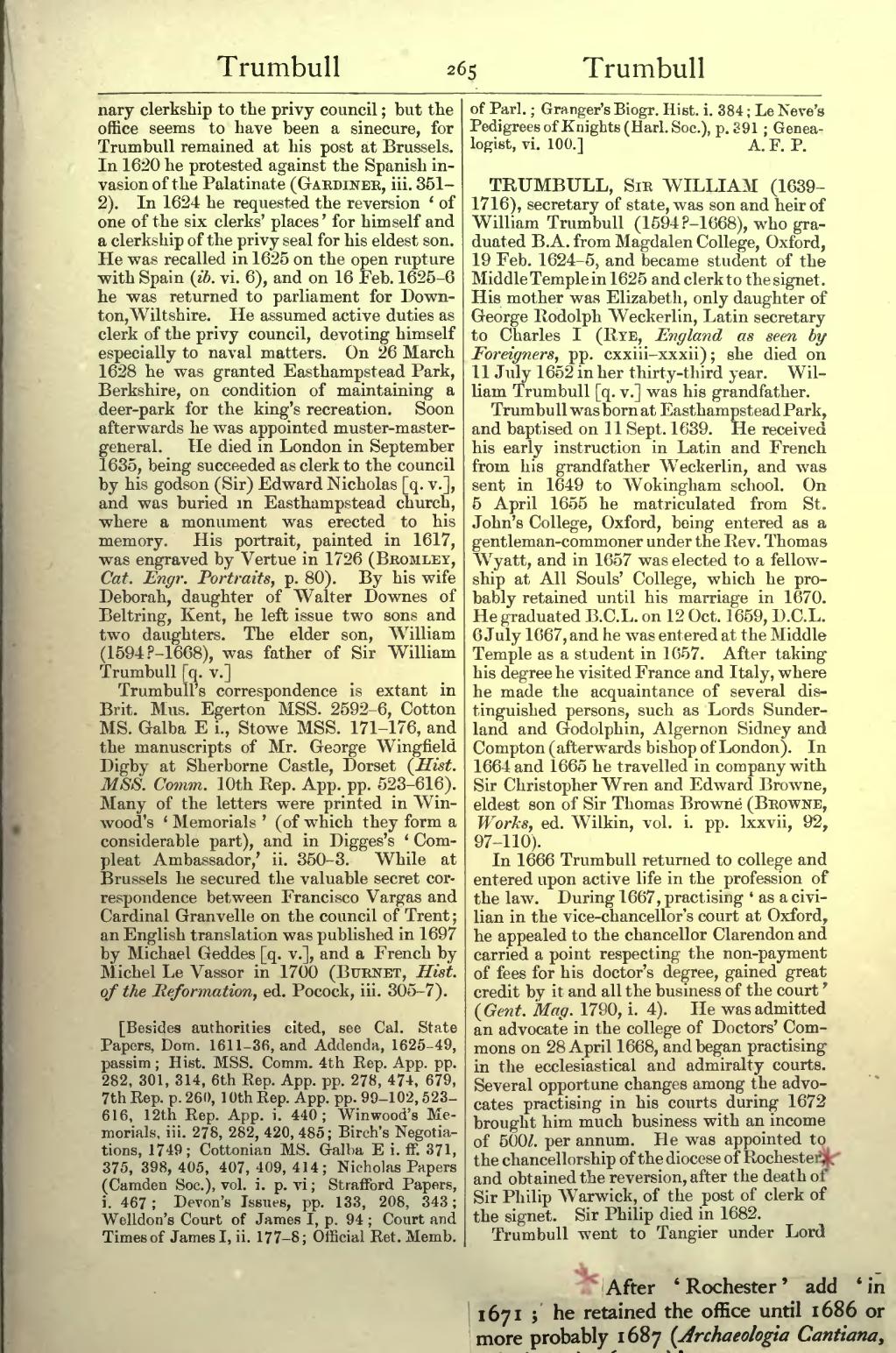nary clerkship to the privy council; but the office seems to have been a sinecure, for Trumbull remained at his post at Brussels. In 1620 he protested against the Spanish invasion of the Palatinate (Gardiner, iii. 351–2). In 1624 he requested the reversion ‘of one of the six clerks' places’ for himself and a clerkship of the privy seal for his eldest son. He was recalled in 1625 on the open rupture with Spain (ib. vi. 6), and on 16 Feb. 1625–6 he was returned to parliament for Downton, Wiltshire. He assumed active duties as clerk of the privy council, devoting himself especially to naval matters. On 26 March 1628 he was granted Easthampstead Park, Berkshire, on condition of maintaining a deer-park for the king's recreation. Soon afterwards he was appointed muster-master-general. He died in London in September 1635, being succeeded as clerk to the council by his godson (Sir) Edward Nicholas [q. v.], and was buried in Easthampstead church, where a monument was erected to his memory. His portrait, painted in 1617, was engraved by Vertue in 1726 (Bromley, Cat. Engr. Portraits, p. 80). By his wife Deborah, daughter of Walter Downes of Beltring, Kent, he left issue two sons and two daughters. The elder son, William (1594?–1668), was father of Sir William Trumbull [q. v.]
Trumbull's correspondence is extant in Brit. Mus. Egerton MSS. 2592–6, Cotton MS. Galba E i., Stowe MSS. 171–176, and the manuscripts of Mr. George Wingfield Digby at Sherborne Castle, Dorset (Hist. MSS. Comm. 10th Rep. App. pp. 523–616). Many of the letters were printed in Winwood's ‘Memorials’ (of which they form a considerable part), and in Digges's ‘Compleat Ambassador,’ ii. 350–3. While at Brussels he secured the valuable secret correspondence between Francisco Vargas and Cardinal Granvelle on the council of Trent; an English translation was published in 1697 by Michael Geddes [q. v.], and a French by Michel Le Vassor in 1700 (Burnet, Hist. of the Reformation, ed. Pocock, iii. 305–7).
[Besides authorities cited, see Cal. State Papers, Dom. 1611–36, and Addenda, 1625–49, passim; Hist. MSS. Comm. 4th Rep. App. pp. 282, 301, 314, 6th Rep. App. pp. 278, 474, 679, 7th Rep. p. 260, 10th Rep. App. pp. 99–102, 523–616, 12th Rep. App. i. 440; Winwood's Memorials, iii. 278, 282, 420, 485; Birch's Negotiations, 1749; Cottonian MS. Galba E i. ff. 371, 375, 398, 405, 407, 409, 414; Nicholas Papers (Camden Soc.), vol. i. p. vi; Strafford Papers, i. 467; Devon's Issues, pp. 133, 208, 343; Welldon's Court of James I, p. 94; Court and Times of James I, ii. 177–8; Official Ret. Memb. of Parl.; Granger's Biogr. Hist. i. 384; Le Neve's Pedigrees of Knights (Harl. Soc.), p. 391; Genealogist, vi. 100.]
TRUMBULL, Sir WILLIAM (1639–1716), secretary of state, was son and heir of William Trumbull (1594?–1668), who graduated B.A. from Magdalen College, Oxford, 19 Feb. 1624–5, and became student of the Middle Temple in 1625 and clerk to the signet. His mother was Elizabeth, only daughter of George Rodolph Weckerlin, Latin secretary to Charles I (Rye, England as seen by Foreigners, pp. cxxiii–xxxii); she died on 11 July 1652 in her thirty-third year. William Trumbull [q. v.] was his grandfather.
Trumbull was born at Easthampstead Park, and baptised on 11 Sept. 1639. He received his early instruction in Latin and French from his grandfather Weckerlin, and was sent in 1649 to Wokingham school. On 5 April 1655 he matriculated from St. John's College, Oxford, being entered as a gentleman-commoner under the Rev. Thomas Wyatt, and in 1657 was elected to a fellowship at All Souls' College, which he probably retained until his marriage in 1670. He graduated B.C.L. on 12 Oct. 1659, D.C.L. 6 July 1667, and he was entered at the Middle Temple as a student in 1657. After taking his degree he visited France and Italy, where he made the acquaintance of several distinguished persons, such as Lords Sunderland and Godolphin, Algernon Sidney and Compton (afterwards bishop of London). In 1664 and 1665 he travelled in company with Sir Christopher Wren and Edward Browne, eldest son of Sir Thomas Browne (Browne, Works, ed. Wilkin, vol. i. pp. lxxvii, 92, 97–110).
In 1666 Trumbull returned to college and entered upon active life in the profession of the law. During 1667, practising ‘as a civilian in the vice-chancellor's court at Oxford, he appealed to the chancellor Clarendon and carried a point respecting the non-payment of fees for his doctor's degree, gained great credit by it and all the business of the court’ (Gent. Mag. 1790, i. 4). He was admitted an advocate in the college of Doctors' Commons on 28 April 1668, and began practising in the ecclesiastical and admiralty courts. Several opportune changes among the advocates practising in his courts during 1672 brought him much business with an income of 500l. per annum. He was appointed to the chancellorship of the diocese of Rochester, and obtained the reversion, after the death of Sir Philip Warwick, of the post of clerk of the signet. Sir Philip died in 1682.
Trumbull went to Tangier under Lord
